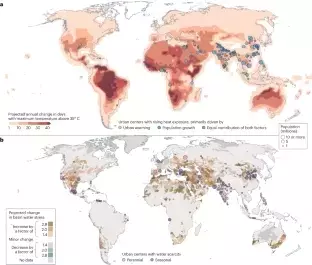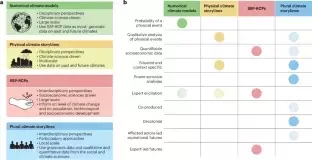



Unlocking the Future: Plural Climate Storylines for Just Urban TransformationManaging climate change-related risks requires robust and actionable insights into future climates. This article presents the plural climate storylines framework, which complements existing physical climate storylines to generate transformative policies and pathways towards climate-just futures.## Empowering Urban Adaptation Through Diverse Narratives### Rethinking Climate Projections: From Physical to Plural StorylinesTraditional climate projections have strengthened the usability of climate data, yet struggled to catalyze action for equitable climate futures. The plural climate storylines framework offers a novel approach, bringing together multiple knowledges on complex social and climatic processes. By exploring urban adaptation through this lens, we unveil four complementary methodological schools that can advance transformative policies:1. **Power-Sensitive Storylines**: Centering the experiences of marginalized communities to uncover hidden vulnerabilities and challenge dominant narratives of climate risk.2. **Decolonizing Storylines**: Elevating Indigenous and local knowledge systems to reframe climate challenges and solutions beyond Western-centric frameworks.3. **Co-Producing Storylines**: Fostering collaborative processes that empower diverse stakeholders to co-create climate narratives and shape adaptation pathways.4. **Aspirational Storylines**: Imagining and materializing climate-just futures through speculative, normative, and transformative visions.### Uncovering Hidden Vulnerabilities: Power-Sensitive StorylinesConventional climate projections often overlook the disproportionate impacts on marginalized urban communities. Power-sensitive storylines shed light on these hidden vulnerabilities by centering the experiences of the most vulnerable. This approach reveals how structural inequities, such as racial and class disparities, intersect with climate risks to exacerbate urban injustices.For instance, studies have shown how urban heat and water stress disproportionately affect low-income and minority neighborhoods, due to factors like lack of green infrastructure and limited access to cooling resources. Power-sensitive storylines can unpack these complex dynamics, empowering marginalized groups to challenge dominant narratives and advocate for equitable adaptation policies.### Reframing Climate Challenges: Decolonizing StorylinesWestern-centric climate science has long dominated the global discourse, often failing to recognize the invaluable knowledge held by Indigenous and local communities. Decolonizing storylines offer an alternative approach, elevating diverse worldviews and epistemologies to reframe climate challenges and solutions.These narratives draw on the rich traditions of community-based environmental management, such as the East Calcutta Wetlands in India, where centuries-old practices of wastewater utilization have sustained urban livelihoods and ecosystems. By centering these local knowledge systems, decolonizing storylines can inspire innovative, culturally-grounded adaptation strategies that move beyond colonial legacies.### Empowering Stakeholders: Co-Producing StorylinesClimate adaptation often suffers from a disconnect between scientific knowledge and the lived experiences of affected communities. Co-producing storylines bridges this gap by fostering collaborative processes that empower diverse stakeholders to co-create climate narratives and shape adaptation pathways.Through inclusive platforms like community-led enumerations and urban reform coalitions, marginalized groups can assert their right to the city and influence decision-making. These co-produced storylines not only generate more relevant and actionable climate information, but also build trust and ownership among stakeholders, crucial for successful implementation.### Imagining Climate-Just Futures: Aspirational StorylinesWhile physical climate projections offer valuable insights into future risks, they often fail to inspire transformative action. Aspirational storylines, in contrast, harness the power of imagination to envision and materialize climate-just futures.These speculative narratives challenge dominant assumptions, explore alternative pathways, and mobilize collective action. By drawing on diverse cultural and artistic traditions, aspirational storylines can capture the emotional and spiritual dimensions of climate change, fostering a sense of hope, solidarity, and collective responsibility.## Unlocking the Potential of Plural Climate StorylinesThe plural climate storylines framework presents a holistic approach to generating climate information that can catalyze transformative policies and pathways towards climate justice. By embracing a diversity of knowledges and perspectives, this framework empowers marginalized communities, reframes climate challenges, and inspires collective action for a more equitable and sustainable future.As we navigate the complex and uncertain terrain of climate change, the plural climate storylines framework offers a promising way forward, unlocking the potential for just urban transformation.
